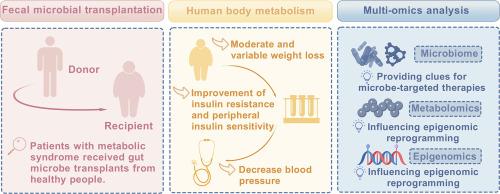粪便微生物移植治疗代谢综合征的临床疗效:临床疗效及多组学研究进展
IF 5.8
Q1 MICROBIOLOGY
引用次数: 0
摘要
尽管代谢综合征(MetS)对人类健康和生命构成严重威胁,但现有的治疗方法并不十分有效。肠道细菌对宿主代谢的影响一直是众多研究的主题,粪便微生物移植(FMT)在减少代谢综合征患者的胰岛素抵抗和腹部肥胖方面显示出巨大的希望。这些FMT研究将肠道微生物群的改变与胰岛素抵抗和肥胖的临床指标联系起来,此外还使用高通量方法分析了MetS患者的肠道微生物群、代谢组和外周血单核细胞的表观基因组。目前仍有必要明确和评估FMT治疗met的临床疗效和作用方式。这篇综述探讨了肠道细菌与MetS之间的联系,FMT作为一种治疗方法的有效性,以及干预后肠道微生物组、代谢组、表观基因组和其他组蛋白的变化。我们还讨论了FMT的安全性,并提出了进一步研究的领域。本文章由计算机程序翻译,如有差异,请以英文原文为准。

Clinical effectiveness of fecal microbial transplantation for metabolic syndrome: Advances in clinical efficacy and multi-omics research
Even though metabolic syndrome (MetS) poses a serious risk to human health and life, existing treatment approaches are not very effective. The impact of gut bacteria on host metabolism has been the subject of numerous research, and fecal microbial transplantation (FMT) has demonstrated great promise in reducing insulin resistance and abdominal obesity in individuals with metabolic syndrome. These FMT investigations have connected alterations in the gut microbiota to clinical indicators of insulin resistance and obesity, in addition to using high-throughput methods to analyze the gut microbiome, metabolome, and epigenome of peripheral blood mononuclear cells in patients with MetS. It is still necessary to clarify and assess the clinical effectiveness and mode of action of FMT in the management of MetS. This review examines the connection between gut bacteria and MetS, the effectiveness of FMT as a treatment, and the changes in the gut microbiome, metabolome, epigenome, and other histones following the intervention. We also discuss the safety of FMT and suggest areas for further investigation.
求助全文
通过发布文献求助,成功后即可免费获取论文全文。
去求助
来源期刊

Current Research in Microbial Sciences
Immunology and Microbiology-Immunology and Microbiology (miscellaneous)
CiteScore
7.90
自引率
0.00%
发文量
81
审稿时长
66 days
 求助内容:
求助内容: 应助结果提醒方式:
应助结果提醒方式:


